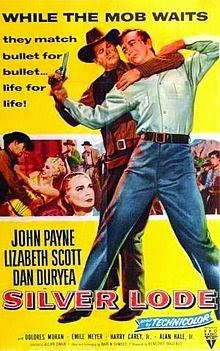A town called 'Silver Lode'
Richard Brody, the film critic at The New Yorker, does a recommendation thing called 'Movie of the Week' at the magazine. On March 4, 2015, he recommended a 1954 movie titled Silver Lode.
Below is the wikipedia plot summary for the movie:
The director, Allan Dwan, manages to portray the townspeople as a powerful mob that, despite its best intentions, cannot help being fickle. Although the townspeople pretend to follow the rule of law, there are no doubts that taking justice into their own hands is their preferred route. Initially, when they are on the side of Dan Ballard, they threaten to kill the US Marshal and his deputies; later on, when they turn against Dan, they gleefully (and drunkenly) mobilize to lynch him. They groan in disapproval when the town judge suggests that mob violence may be a bad thing. That self-righteous communities are prone to develop a disregard for an individual's life emerges cleanly as a axiom.
Below is the wikipedia plot summary for the movie:
...tells the story of Dan Ballard (John Payne) and Rose Evans (Lizabeth Scott) who are about to be married in the western town of Silver Lode when Marshal Fred McCarty (Dan Duryea) and his deputies ride into town looking for Ballard. McCarty accuses Ballard of having murdered his brother and has come to arrest him.
At first, the townspeople are on Ballard's side, but gradually they turn against him, especially when they believe that he has killed the town sheriff (Emile Meyer). Ballard tries to prove his innocence and expose McCarty.
While the whole town is out to lynch Dan, his two lady interests continue to believe in his innocence. One is his betrothed Rose, and the other is the town hussy Dolly, with whom Dan has had some dalliance earlier. Near the end, it becomes clear that only a wire message from a federal department, specifying that McCarty and his goons aren't US Marshals but are in fact wanted criminals, can save Dan from the mob. When the message does not arrive in time, Dolly forces the wire operator to write it anyway, threatening him with revealing his (non-existent) infidelities to his wife. Rose hurries away with the scrap of paper, revealing it to the town judge and the townspeople, thus saving Dan. When the real message, containing content similar to the one Dolly has dictated, arrives, Dolly excitedly runs away with that scrap of paper towards the mob. The movie ends here. But of course we know that Dan is already saved. Dolly has saved him through a lie, but it is Rose who has become the saviour. The truth, in Dolly's hand, is now only a needless repetition. This is the tragedy, we must understand, of indecent girls.
The high point in the movie for me was Dolores Moran, who played the role of Dolly. The reason why she was a high point can probably be made obvious through Dolores' picture below (not from this movie, but gives you an idea of what I'm talking about):
But jaw-dropping beauty aside, Dolores' portrayal of Dolly, the bar-girl in love with Dan Ballard, is near-perfect. Her tragedy always seeps through her seductive gestures, but never subsumes those. She remains a character who is there to be understood for those who care to look beyond the sex appeal.




Comments
Post a Comment